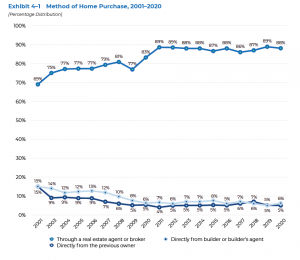Maintaining a good relationship requires occasional check ins on how things are going – and that includes relationships between home buyers and real estate pros.
For its updated relationship “report card,” the National Association of Realtors surveyed new home buyers who closed from July, 2019, through June, 2020, on how their purchasing process went. NAR’s analysis breaks out the numbers by all buyers, first-time or repeat buyers, and adult household composition.
Here are some of the main takeaways from their “2020 Profile of Home Buyers and Sellers.”
Buyers continue to see the benefit of working with agents or brokers.
A healthy 88% of recent home buyers say they worked with a real estate professional. Compare it with the 82% in 1981, and you’ll see that rise holding steady. Buyers in the West were most likely to buy through an agent (90%), followed by unmarried couples (90%) and single males (88%).
Answering that climb are declines in other purchasing methods. Of note, 6% of buyers purchased directly from the builder or builder’s agent, versus 8% in 1981. Furthermore, 5% bought directly through the previous owner, versus 10% in 1981.
When you break it down by whether buyers had previously owned a home, the purchase from a builder rate went up much higher to 38%, which is up from 36% in 2019.

Sellers still are more likely to pay agents’ commissions.
When it comes to who’s paying, “seller only” is at 55%; “buyer only” is at 2%; and “split between buyer and seller” is at 12%. The majority of agents are compensated as a percentage of sale price.
Disclosures and formal arrangements between buyers and agents aren’t standard.
Only slightly more than half of buyers reported signing an agent representation disclosure, including 40% with a written arrangement; 28% had no arrangement at all, which is unchanged from 2019.
Buyers want agents to find the right home and help them navigate the deal.
Half of buyers most wanted help finding the right home (51%), but negotiating terms and prices came in at a combined 24%. Single females prioritized help finding the right property more than other types of households.
When it comes to negotiating, unmarried couples, repeat buyers and buyers of previously owned homes were most likely to want help finalizing the transaction. Fewer buyers worked with an agent when buying a new home from a builder.
Buyers said the top benefits of working with an agent were: 1) helping them understand the process (62% of all buyers, but 83% of first-time buyers); and 2) pointing out unnoticed features or faults with the property (61% of all buyers and 59% of repeat buyers).
The next most-valued benefits were negotiating better terms of the sale, providing a list of service providers such as home inspectors, and increasing buyers’ knowledge about where to search.
Finding agents is all about referrals.
Of all buyers, 40% of them (and 50% of first-time buyers) were referred to their agent by a friend, neighbor, or relative. Repeat business factored into buyers’ choices at 13% overall, but 18% of previous home buyers returned to their last agent. Married couples were the most likely to return to work with an agent.
A combined 13% met their agent either through inquiring about a property they saw online or visiting a website.
Buyers tended not to shop around for help.
Three-quarters of all buyers, including repeat buyers, interviewed only 1 agent. First-time buyers were most likely to interview 2 agents.
Most of all, buyers need to trust and feel comfortable with their agent.
In choosing an agent, buyers are looking for professionals who are honest and trustworthy (21%), have a good reputation (15%), or are someone they know personally, such as a friend or family member (13%). Moreover, 18% valued the agent’s experience the most.
When ranking the skills or personal qualities they felt were important, honesty and integrity was the clear winner, at 98%. Also in the 90s were responsiveness as well as knowledge of the buying process and the real estate market. The next most highly ranked: communication, negotiation, and people skills. Technology skills were ranked last, but single females were most likely to value them.
Interestingly, the onset of the COVID-19 appears to be starting to have an impact on what buyers value. To identify pandemic-related trends, NAR compared responses to some questions from buyers who had closed from April through June, 2020, with those who had closed earlier. They found the beginnings of upswings in the percentage of buyers who most valued honesty and personal relationships. The category of “Agent is friend or family member” climbed by 5 points, suggesting buyers might now feel safer with people they know. “Agent is honest and trustworthy” climbed by 3 points. Experience and reputation were rated as slightly less important.
When it comes to communication, repeat buyers most valued personal calls, while first-time buyers most appreciated texts. Nearly three-quarters of all buyers want immediate notifications of listings, price changes or contract status.
Buyers are giving their agents As on their report cards.
Notably, 91% of buyers said they were very satisfied with their agent’s honesty and knowledge of the purchase process. And even further, 90% were very satisfied with responsiveness. Negotiation skills ranked lowest, at 78%.
When asked if they would use their agent again, 76% gave an emphatic “definitely,” and 15% said “probably.” About a third of buyers had not recommended their agent to anyone, but the typical number of recommendations was two.
Data suggests there is room for improvement, though.
One thing that stands out: For household composition, the category of “other” is fairly high throughout, suggesting it’s time for analysis and reporting to delve a little deeper into buyers who don’t fit the standard categories. One example: While 88% of all buyers purchased through an agent or broker, 93% of people in the “other” category did so. Also, 40% of all buyers found their agent through referral; the “other” category was 37%.
What type of buyers are under “other”? NAR’s numbers after the onset of the pandemic revealed a trend toward purchases of homes suitable for multiple generations as well as unrelated adults who are likely pooling income.
That “other” represents a lot of buyers, making it a great place for agents to look for niches as well as to refine their targeted marketing strategies.
Lisa Wyatt Roe is an Austin writer and editor whose work has been featured on CNN.com/Travel, in Texas Parks & Wildlife Magazine and in the book “Seduced by Sound: Austin; 100 Musicians on Why They Make Music.” Travel and live music feed her soul. Volunteering with refugees feeds her sense of purpose. And making friends laugh feeds her deep (yet possibly sad) need to get all the laughing emojis on Facebook.













































